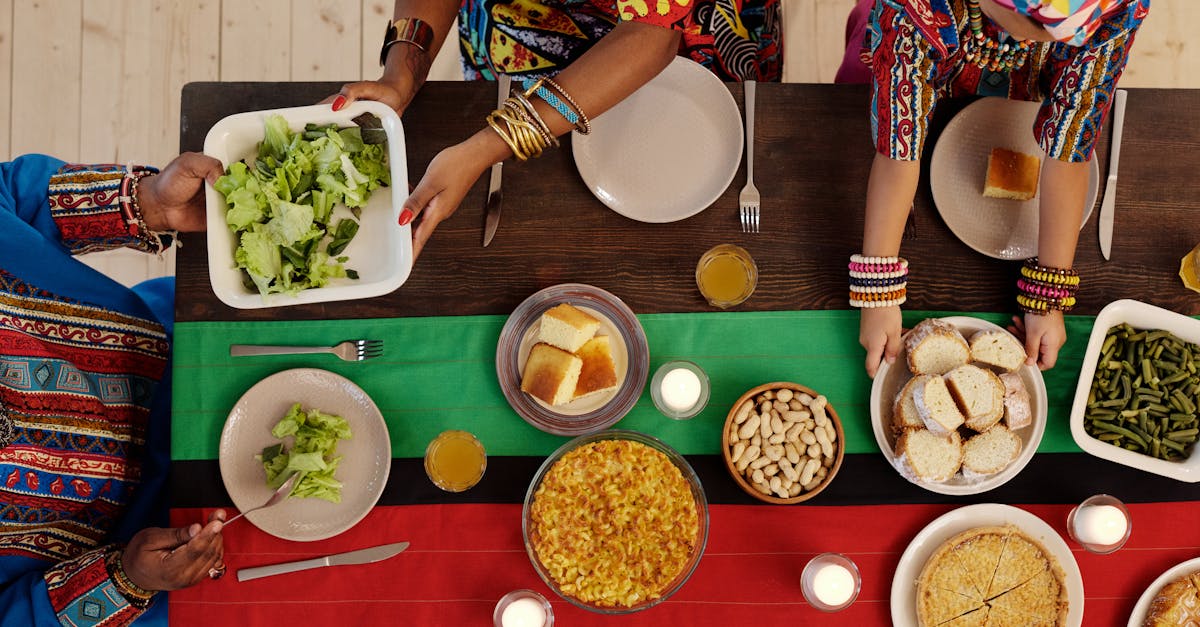Explore the vibrant tapestry of flavors that define African cuisine in all its diversity and richness. From the spicy aromas of North African dishes to the bold and hearty flavors of West African stews, embark on a culinary journey like no other as we unravel the unique tastes that make African cuisine a true gem of the culinary world.
Different influences on African cuisine

When it comes to African cuisine, the flavors and dishes reflect a rich tapestry of influences from various cultures and regions. From traditional dishes passed down through generations to modern fusion creations, African cuisine is a delightful mix of history, tradition, and innovation.
Global Black Impact Summit (GBIS) 2024
The Global Black Impact Summit provides a platform to explore the diverse influences on African cuisine. Through discussions and culinary showcases, participants can delve into the culinary heritage of Africa and its impact on the global culinary scene.
Exploring Spain’s Arab Influence
One of the key influences on African cuisine comes from Spain’s Arab heritage. The Moors introduced ingredients such as almonds, citrus fruits, and spices like cumin and coriander to North Africa, shaping the flavors of dishes like tagines and couscous.
Effects of Climate Change on Agriculture in Africa
Climate change poses challenges to African agriculture, impacting the availability of certain crops and ingredients crucial to traditional dishes. This has led to adaptations in cooking styles and ingredient choices, showcasing the resilience and creativity of African chefs.
26 Black Food Bloggers on Instagram – Black Chefs and Bakers
Social media has played a significant role in highlighting the diverse influences on African cuisine. Black food bloggers and chefs on platforms like Instagram share their unique interpretations of traditional African dishes, incorporating global ingredients and cooking techniques.
Understanding African Trade
Exploring the trade routes and historical connections within Africa reveals how ingredients like spices, grains, and vegetables have traveled across borders, influencing the culinary landscape. Understanding these trade networks is crucial to appreciating the diversity of African cuisine.
Plenty to Explore on the New Kipling’s Brasserie Menu
Modern restaurants like Kipling’s Brasserie showcase the fusion of African flavors with international cuisines. Dishes like peri-peri chicken wings and bobotie sliders offer a contemporary twist on traditional African recipes, appealing to a global audience.
In conclusion, African cuisine is a vibrant tapestry woven together by diverse influences, from historical trade routes to modern innovations. By exploring the rich heritage and flavors of African dishes, food enthusiasts can embark on a culinary journey that celebrates diversity and cultural exchange.
Regional specialties and ingredients

Discovering the Diverse Flavors of African Cuisine
African cuisine is as diverse as the continent itself, with each region offering a unique culinary experience that reflects its cultural heritage and natural resources. From the spicy flavors of North Africa to the rich stews of West Africa and the exotic spices of the East, African cuisine is a true reflection of the continent’s rich history and vibrant traditions.
Must-Try Regional Specialties
– Jollof Rice (West Africa): A flavorful dish of rice, tomatoes, and spices popular in countries like Nigeria, Ghana, and Senegal.
– Bunny Chow (South Africa): A hollowed-out loaf of bread filled with curry, a South African street food favorite.
– Injera (Ethiopia): A spongy flatbread made from teff flour, traditionally served with stews and salads.
– Bobotie (South Africa): A sweet and savory dish made with spiced minced meat topped with an egg custard.
Unique Ingredients That Define African Cuisine
– Yams: A staple in many West African dishes, yams are versatile tubers used in soups, stews, and fritters.
– Plantains: A close relative of the banana, plantains are a common ingredient in Central and West African cuisine and can be fried, boiled, or mashed.
– Berbere: A fiery spice blend from Ethiopia made with chili peppers, garlic, ginger, and various aromatic herbs.
– Baobab Fruit: This superfood native to Africa is high in vitamin C and can be used in smoothies, desserts, and jams.
Exploring the Culinary Landscape of Africa
Whether you’re indulging in a West African peanut stew, savoring the delicate flavors of North African couscous, or enjoying a South African braai (barbecue), exploring African cuisine is a gastronomic adventure like no other. Each bite tells a story of tradition, innovation, and the vibrant tapestry of flavors that make African cuisine truly unique.
Embracing the Essence of African Ingredients
From the fragrant spices of Morocco to the tropical fruits of the Congo, African ingredients have captivated chefs and food enthusiasts around the world. By embracing the essence of ingredients such as berbere, yams, and baobab fruit, we not only savor the flavors of Africa but also honor the rich culinary heritage of the continent.
A Taste of Africa, A Journey of Flavor
Embark on a culinary journey through Africa’s diverse culinary landscape and discover the hidden gems of regional specialties and unique ingredients that define African cuisine. Explore the vibrant markets, savor the exotic spices, and immerse yourself in the rich traditions that make African cuisine a true delight for the senses. Join us as we unravel the flavors of Africa, one dish at a time.
Traditional cooking methods

African cuisine is a vibrant tapestry of flavors, colors, and textures, deeply rooted in tradition and culture. One of the most fascinating aspects of African culinary heritage is its traditional cooking methods, which have been passed down through generations. Let’s delve into the diverse and unique ways in which African communities prepare their meals, keeping their cultural identity alive through food.
Open-fire Cooking
Central to many African cooking traditions is open-fire cooking. Whether using a large communal pot over an open flame or grilling meat on skewers over hot coals, open-fire cooking imparts a distinctive smoky flavor to dishes. This method not only adds complexity to the taste but also creates a sense of community as families and friends gather around the fire to cook and share a meal.
One-Pot Cooking
One-pot cooking is a popular technique in African cuisine, where various ingredients are combined in a single pot to create flavorful dishes. From stews to soups to hearty casseroles, this method allows for the melding of flavors as the ingredients simmer together. In West Africa, dishes like jollof rice and groundnut stew showcase the artistry of one-pot cooking, where each spoonful tells a story of tradition and heritage.
Fermentation and Preservation
Fermentation and preservation techniques are integral to many African cuisines, ensuring that ingredients can be enjoyed year-round. Fermented foods like injera in Ethiopia, ogi in Nigeria, or umqombothi in South Africa are staples that have been fermented for days to develop their unique flavors. Preservation methods such as sun-drying fruits and vegetables or smoking meat not only extend the shelf life of ingredients but also enhance their taste profiles.
Grinding and Pounding
In many African cultures, grinding and pounding ingredients by hand using tools like mortars and pestles remain prevalent practices. The rhythmic sound of pounding spices, grains, or vegetables not only breaks them down but also unlocks their flavors. This method is evident in dishes like fufu in Ghana or pounded yam in Nigeria, where the texture and consistency achieved through manual labor are unparalleled.
African cuisine’s traditional cooking methods are a testament to the rich tapestry of culinary practices that have stood the test of time. From open-fire cooking to fermentation and preservation techniques, each method reflects the deep connection between food, culture, and community. By preserving these age-old traditions, African communities continue to celebrate their heritage through the art of cooking, keeping their culinary legacies alive for generations to come.
